Overview
- Brief Narrative
- Headset used by Rudolph Hess during the Nuremberg war crimes trials.
- Date
-
use:
1945 November 20-1946 October 01
- Geography
-
use:
Palace of Justice;
Nuremberg (Germany)
- Credit Line
- United States Holocaust Memorial Museum Collection, Gift of the IBM Corporation
- Contributor
-
Manufacturer:
International Business Machines Corporation
Subject: Rudolf Hess
- Biography
-
Rudolf Hess was born as Walter Richard Rudolf Hess on April 26, 1894, in Alexandria, Egypt. His father was a merchant. Hess served in the German Army in World War I (1914-1918) He then studied at the University of Munich, where he became an advocate of extremist German nationalism. Hess joined the Nazi (National Socialist) Party in 1920. He quickly became a close friend and confidant of Adolf Hitler. He participated in the 1923 Munich Beer Hall Putsch where the Nazis attempted to overthrow the Weimar government. He fled to Austria but returned to join Hitler in Landsberg Prison, where he recorded and helped draft Mein Kampf. Hess became Hitler's personal secretary and worked to centralize the Nazi Party structure. On January 1, 1933, Hitler was appointed Chancellor of Germany. In April, Hess was made deputy fuhrer of the Party and, in December, he became a cabinet member. In 1939, Hitler made Hess second to Goering in the line of succession. On May 10, 1941, Hess secretly flew to Scotland with the intent of making peace between Germany and Great Britain. He was arrested and jailed by the British as a prisoner of war. Hitler accused him of suffering from pacifist delusions. On May 7, 1945, the war ended with Germany's surrender. The United Nations soon convened an International Military Tribunal (IMT) to prosecute those responsible for violence to the civilian population, evidenced by the Holocaust. The IMT was convened by eighteen Allied Nations and conducted by the four major powers, the United States, Great Britain, France, and the Soviet Union. Hess was one of 22 defendants charged with crimes against peace, war crimes, crimes against humanity, and conspiracy to commit these crimes, for the first trial, the Major German War Criminals Trial. It began in Nuremberg on November 20, 1945. Hess feigned amnesia and did not take the stand. The verdicts were delivered on October 1, 1946. Twelve defendants were sentenced to death. Hess was sentenced to life imprisonment and confined in Spandau prison in Berlin. From 1966 on, he was the only inmate. Hess, 93, committed suicide on August 17, 1987, in Spandau.
Physical Details
- Classification
-
Audiovisual and Photographic Materials
- Category
-
Audio equipment
- Object Type
-
Headphones (lcsh)
- Physical Description
- Black plastic earpieces connected by headband; paper identification tag attached w/wire.
- Dimensions
- overall: | Width: 7.200 inches (18.288 cm)
- Materials
- overall : metal, plastic, leather
Rights & Restrictions
- Conditions on Access
- No restrictions on access
- Conditions on Use
- No restrictions on use
Keywords & Subjects
Administrative Notes
- Legal Status
- Permanent Collection
- Provenance
- The headphones were donated to the United States Holocaust Memorial Museum in 1996 by the IBM Corporation.
- Record last modified:
- 2022-07-28 18:23:20
- This page:
- https://collections.ushmm.org/search/catalog/irn11609
Download & Licensing
In-Person Research
- By Appointment
- Request 21 Days in Advance of Visit
- Plan a Research Visit
- Request to See This Object
Contact Us
Also in IBM Corporation collection
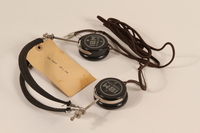
Karl Dönitz's Nuremberg war crimes trial headphones
Object
Headset used by Karl Dönitz during the Nuremberg war crimes trials.
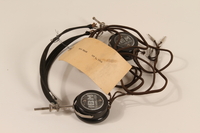
Hans Frank's Nuremberg war crimes trial headphones
Object
Headset used by Hans Frank during the Nuremberg war crimes trials.
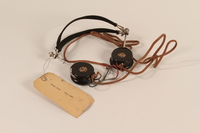
Wilhelm Frick's Nuremberg war crimes trial headphones
Object
Headset used by Wilhelm Frick during the Nuremberg war crimes trials.
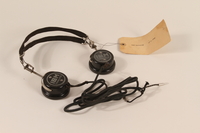
Hans Fritzsche's Nuremberg war crimes trial headphones
Object
Headset used by Hans Fritzsche during the Nuremberg war crimes trials.
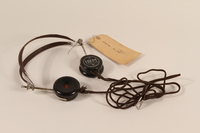
Walther Funk's Nuremberg war crimes trial headphones
Object
Headset used by Walther Funk during the Nuremberg war crimes trials.
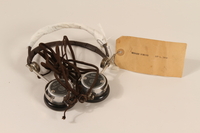
Hermann Göring's Nuremberg war crimes trial headphones
Object
Headset used by Hermann Göring during the Nuremberg war crimes trials.
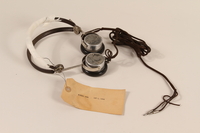
Alfred Jodl's Nuremberg war crimes trial headphones
Object
Headset used by Alfred Jodl during the Nuremberg war crimes trials.
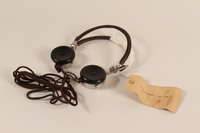
Ernst Kaltenbrunner's Nuremberg war crimes trial headphones
Object
Headset used by Ernst Kaltenbrunner during the Nuremberg war crimes trials.
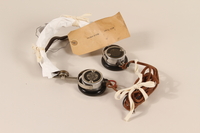
Wilhelm Keitel's Nuremberg war crimes trial headphones
Object
Headset used by Wilhelm Keitel during the Nuremberg war crimes trials.
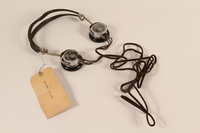
Erich Raeder's Nuremberg war crimes trial headphones
Object
Headset used by Erich Raeder during the Nuremberg war crimes trials.
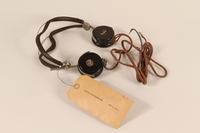
Joachim von Ribbentrop's Nuremberg war crimes trial headphones
Object
Headset used by Joachim von Ribbentrop during the Nuremberg war crimes trials.
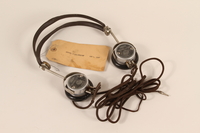
Arthur Seyss-Inquart's Nuremberg war crimes trial headphones
Object
Headset used by Arthur Seyss-Inquart during the Nuremberg war crimes trials.
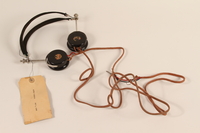
Alfred Rosenberg's Nuremberg war crimes trial headphones
Object
Headset used by Alfred Rosenberg during the Nuremberg war crimes trials.
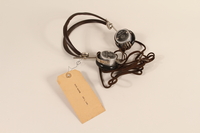
Fritz Sauckel's Nuremberg war crimes trial headphones
Object
Headset used by Fritz Sauckel during the Nuremberg war crimes trials.
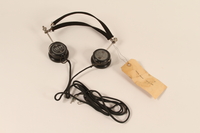
Hjalmar Schacht's Nuremberg war crimes trial headphones
Object
Headset used by Hjalmar Schacht during the Nuremberg war crimes trials.
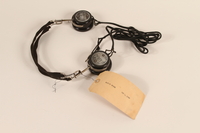
Albert Speer's Nuremberg war crimes trial headphones
Object
Headset used by Albert Speer during the Nuremberg war crimes trials.
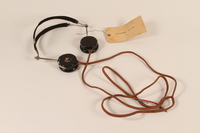
Julius Streicher's Nuremberg war crimes trial headphones
Object
Headset used by Julius Streicher during the Nuremberg war crimes trials.
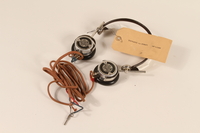
Konstantin von Neurath's Nuremberg war crimes trial headphones
Object
Headset used by Konstantin von Neurath during the Nuremberg war crimes trials.
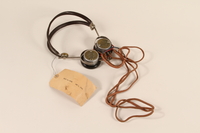
Franz von Papen's Nuremberg war crimes trial headphones
Object
Headset used by Franz von Papen during the Nuremberg war crimes trials.
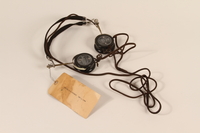
Baldur von Schirach's Nuremberg war crimes trial headphones
Object
Headset used by Baldur von Schirach during the Nuremberg war crimes trials.



